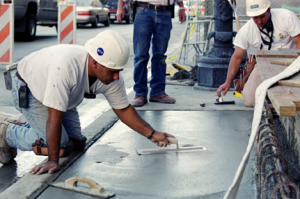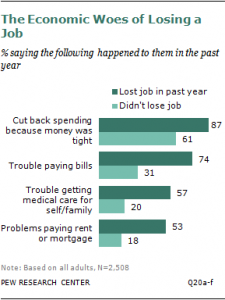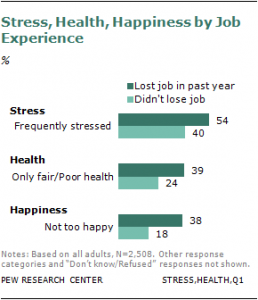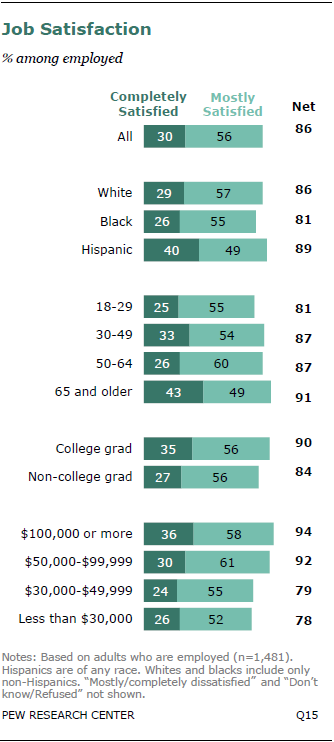- Home
- News
- Features
- Topics
- Labor
- Management
- Opinions/Blogs
- Tools & Resources
Working In America: Job Security Important To The Middle Class
By Wendy Wang, Pew Research Center– The value Americans place on having a secure job is underscored by findings from the same Pew
Research survey that show that losing a job is associated not just with economic difficulties, but also with stress and unhappiness.
In the Pew Research survey, 15% of respondents said they lost their job or got laid off in the past year.
Those who lost jobs have faced many economic hardships in their day-to-day lives over the past year: Close to
nine-in-ten (87%) say they had to cut back their household spending because money was tight,about seven-in-ten (74%) had trouble paying bills, about six-in-ten (57%) say they had trouble getting or paying for medical care for themselves or their family, and about half (53%) say they had problems paying their rent or mortgage. In each case, the rate among adults who experienced a job loss in the past year is much higher than the rate among those who did not.
Job loss is also related to a lower level of financial confidence for the future. About three-in-ten (31%) adults who lost a job in the past year say that they are “not at all confident” about having enough income and assets to last throughout their retirement years, compared with 14% of adults who did not have the experience.
The experience of losing a job affects life in other ways. It is related to a higher level of stress in daily life, poorer health and a lower level of happiness, according to what respondents reported in the survey.
About half of adults (54%) who lost a job last year say they are “frequently” stressed in daily life, roughly four-in-ten (39%) rate their health as “only fair” or “poor,” and 38% say they are not too happy in life. These
rates are much higher than those among adults who did not experience a job loss last year.
Satisfaction Is High For Middle Class Americans With Jobs
A vast majority of American workers (86%) say they are either completely or mostly satisfied with their jobs, 10% say they are mostly dissatisfied, and only 3% of workers are completely dissatisfied with their jobs.
Underemployment affects job satisfaction. Of all workers, about one-quarter (24%) report that they are currently working part time, and about half of these part-time workers (53%) say they would prefer to be working full time.
Workers who are currently part time but want a full-time job are less happy about their jobs. The job satisfaction rate is 67% among underemployed workers but 94% for those who choose to work part time.
Job satisfaction also varies by some demographic characteristics. Hispanic workers are more likely than black workers to be satisfied with their jobs overall (89% vs. 81%), and they are more likely to say they are “completely satisfied” with their jobs (40%), compared with 29% of white and 26% of black
workers.
Men and women are equally satisfied with their jobs.
Older workers, especially those ages 65 and older, have a higher satisfaction rate (91%) at work than do workers younger than 30 (81%). The age difference is also reflected at the degree of satisfaction: Only a quarter of workers in their 20s are “completely satisfied” with their jobs, compared with about four-in-ten (43%) workers ages 65 or older.
Higher education and income is related to higher job satisfaction. Workers with a college education are more satisfied with their jobs than those without a college degree (90% vs. 84%). And nine-in-ten workers whose family income is $50,000 or higher are satisfied with their job, compared with about eight-in-ten of those with a family income below $50,000.
Making Progress On Career Goal
The Pew Research survey also asked all but retired adults about their work or career goals. Overall, Americans are positive about the progress they are making toward their career goals. About seven-in-ten (69%) say that they are making progress to advance their work or career, about a quarter (24%) say they are not making progress, and 3% volunteer that there is no change in terms of their work or career advancement.
In general, a higher percentage of men than women say that they are making progress toward their work or career goals (75% vs. 64%). However, this finding varies by race. Black men and women do not differ in their perceived progress toward work or career goals (70% vs. 71%, respectively), but the gender difference is significant between white men (76%) and women (62%) as well as between Hispanic men (75%) and women (62%).
Younger adults are more positive than older adults about their progress at work. About eight-in-ten (84%) of young adults ages 18 to 34 say they are making progress toward their goals, compared with about half of the adults (51%) ages 50 or older.
Education also matters. College-educated adults are more likely than those without a four-year college degree to say they are making progress in their job or career (80% vs. 65%). And adults with higher family income are also more positive about their progress than are those with lower family income.
Not surprisingly, employment status is directly related with how people view the progress about their career goals. Roughly three-quarters of employed adults (77%) are satisfied with their career progress, compared with 48% of adults who are looking for work and 40% who are not looking.
Related links:
Long-Term Unemployment — Lost Income, Lost Friends, Loss of Self-respect
Young, Underemployed And Optimistic – Coming Of Age In A Tough Economy
List your business in the premium web directory for free This website is listed under Human Resources Directory








